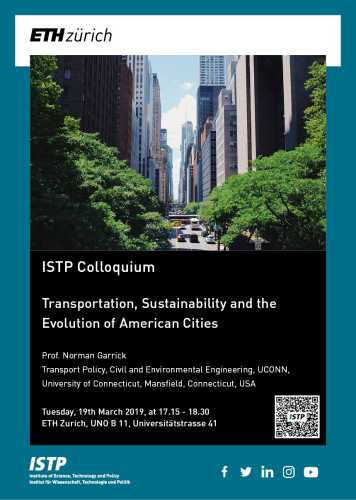Colloquium: Prof. Norman Garrick
Tuesday, 19th March 2019, at 17.15 - 18.30
ETH Zurich, UNO B 11, Universitätstrasse 41
Transportation, Sustainability and the Evolution of American Cities

Over the last 10 years, our research team at the University of Connecticut has conducted various studies of the changes in the transportation systems and the urban form of a number of American cities. We used historical documentation, including aerial photographs, fire insurance maps (from the Sanborn company), and reports of various kinds to develop detailed digital representations of cities at different periods in time, in some cases going back to the early 1900s.
The renowned urban thinker, Jane Jacobs, points to the collective amnesia that results from forgetting how things were and how they worked. This digital reconstruction is an attempt to bridge the gap in our memory of how cities once functioned. Our goal is to better understand how these cities have changed over time, the implications of these changes for cities today and into the future, and the transportation and urban planning policies and practices that have contributed to the observed changes.
In our work, we found that most cities in the USA have followed a conventional approach to planning that is predicated upon accommodating automobile use. A small handful of cities have followed polices that have been less permissive in accommodating automobile use and serve as an important counterpoint. Our analysis shows that the difference in the evolution of these two groups of cities is stark, not just in terms of urban form and transportation use, but also by most measures of sustainability. Those cities that are less auto-permissive are doing much better from the perspective of environmental, social and economic sustainability. This research adds to the evidence suggesting that we need to re-think how we plan urban places and urban transportation, and also provides some important markers toward a more sustainable approach to planning cities.
About Prof. Norman Garrick
In this era of mega-cities, urban decay, and suburban sprawl - along with global climate change and energy insecurity - the issue of how we create more sustainable places is the fundamental challenge facing transportation professionals. In his research he aims to continue to advance their understanding of sustainable places in order to equip students from across the globe with the wherewithal to plan, design and build better, more attractive, more efficient and more livable and yes, more loveable places.